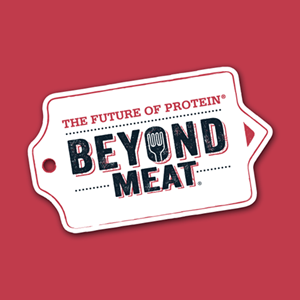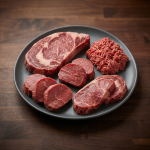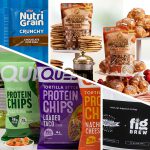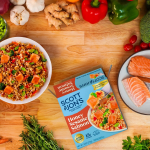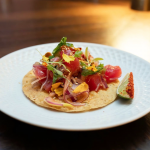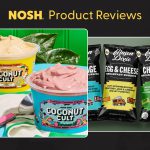The Checkout: Beyond Meat Reports Q3 Losses Amid McPlant Confusion
Welcome to The Checkout: an express lane for weekly news you need to know, always 10 items or less.
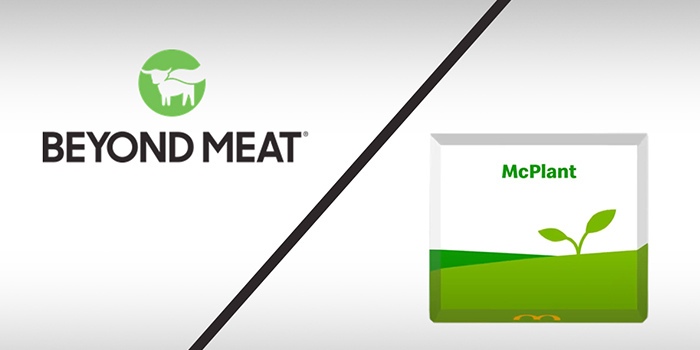
Beyond Meat Reports Q3 Earnings, Addresses McDonald’s Partnership Confusion
Plant-based meat maker Beyond Meat on Monday reported its third quarter earnings, which reflected a pandemic related hit to its foodservice business along with declining retail sales following less consumer stockpiling. During Q3, the company saw a $19.3 million net loss compared to $4.1 million net income in Q3 a year ago, with net revenues of $94.4 million, a 2.7% year-over-year increase.
“Our financial results reflect a quarter where for the first time since the pandemic began, we experienced the full brunt and unpredictability of COVID-19,” Beyond Meat president and CEO Ethan Brown said in a press release. “Unlike the second quarter where record retail buying and freezer loading by consumers offset the deterioration of our foodservice business as COVID-19 stay-at-home and related measures set in, the long tail of retail stockpiling by consumers, coupled with continued challenges across the majority of our foodservice customers, led to Q3 results that were lower than we expected.”
Despite the decrease in its foodservice business, Brown said Beyond Meat will continue to invest in “pillars of future growth,” after expanding its manufacturing capabilities this year with the opening of new plants in the E.U. and China and the acquisition of a new plant in Pennsylvania this quarter.
The earnings call followed McDonald’s announcement earlier that day of a new plant-based burger called the McPlant, which the fast food chain claimed was made “for McDonald’s, by McDonald’s.” The announcement brought into question Beyond Meat’s supplier relationship with the chain, who began working with Beyond Meat last year to test a burger made with Beyond Meat in Canada. According to CNBC, the news “sparked confusion among investors,” who thought the new McPlant could possibly be a competitor to Beyond Meat.
The chain has still not yet confirmed whether Beyond Meat will be the supplier for the McPlant. A Beyond Meat spokesperson said in statement that the company co-created the patty with McDonald’s, according to CNBC, but Brown also told the outlet he “just can’t go out and speak for [McDonald’s]” regarding which supplier it will use. Brown also said in the earnings call that he respects McDonald’s choice to “refer to the McPlant platform in a generic sense.”
“We are working very closely with them on a number of matters,” he said. “And I think that folks just have to continue to be patient. But I feel, as I said in the past, good about that relationship and good about what we’re contributing to the McPlant platform.”
Beyond Meat will also begin supplying meat-free sausage for two pizzas on Pizza Hut’s U.S. menu, the company announced this week, expanding its partnership with the chain after supplying its sausage to locations in China, Puerto Rico and the U.K.
Food Industry Groups Pen Letter to White House Asking for COVID-19 Vaccine Priority
In a letter to President Trump this week, food and beverage industry trade groups asked for priority access to a COVID-19 vaccine once it is developed. Fifteen groups including the National Grocers Association, the Consumer Brands Association and FMI – The Food Industry Association co-signed the letter requesting that the food industry’s essential workers be among those who have access to the vaccine should the initial supply be limited.
“Our members have been on the front lines of the response to the pandemic by continuing operations and ensuring Americans have access to safe, nutritious, and affordable food,” the letter said. “Challenges have taxed the food supply chain over the past eight months, but the food, agriculture, manufacturing, and retail industries are resilient, and the supply chains have not broken.”
The letter comes after pharmaceutical company Pfizer announced earlier this week that it has developed a vaccine that has been shown in early tests to be 90% effective in preventing COVID-19 in trial participants.
The groups sent a similar letter to the White House in June, asking that food and agriculture workers be the next highest priority for vaccine distribution after healthcare workers, first responders and those who are considered high risk individuals. Currently, the Trump administration’s COVID-19 Vaccination Program Interim Playbook for Jurisdiction Operations prioritizes four groups for vaccine distribution: healthcare workers, non-healthcare essential workers, high-risk adults and people 65 and over.
“Prioritizing vaccinations for food, agriculture, retail, and CPG workers will be a key intervention to help keep workers healthy and to ensure that agricultural and food supply chains remain operating,” the letter stated.
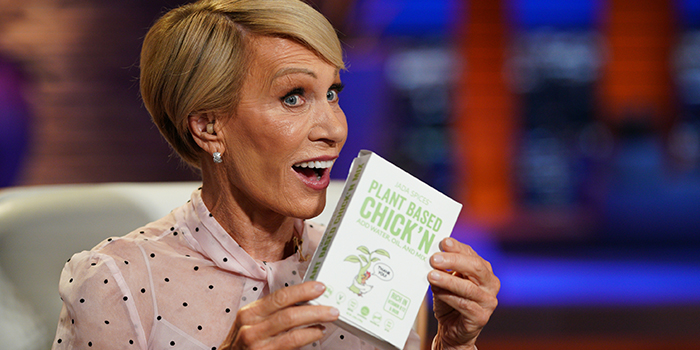
JADA Brands Scores Deal on Shark Tank, Will Launch Plant-based Meat Alternative
Plant-based chicken mix and seasoning maker JADA Brands landed a deal with investor Barbara Corcoran in a “Shark Tank” episode which aired last week. While the company’s original offer was $250,000 in return for a 20% equity stake in our company, they ultimately accepted Barbara’s counter offer of $250,000 for 33% equity.
Founded by Khasha Touloeia and Maynard Okereke, JADA Brands offers a range of turmeric-based vegan seasonings, and introduced its latest product, Plant Based Chick’n Mix, on the show. The soy-free mix is shelf-stable and makes six patties when mixed with water and oil.
“When I heard the pitch for Chick’n Mix, I knew that this was something special that everyone needed on their dinner table,” said Corcoran in a press release. “Plant-based meals are becoming more common than ever, and JADA’s Chick’n Mix is going to help lead that next wave of products.”
Okereke said Corcoran was the “ideal candidate” for JADA, which had been self-funded up to this point, because of her experience working with food brands and “leading them to success.” Corcoran’s previous food investments on the show include snack brand Pipsnacks.
According to Okereke, the funds will be used to support the launch of the Plant Based Chick’n Mix in the areas of branding, packaging and manufacturing as the company seeks to enter both foodservice and retail with the new product.
“The market for plant based meat options is huge, and we believe we are uniquely seated to make a strong dent in it,” he said.
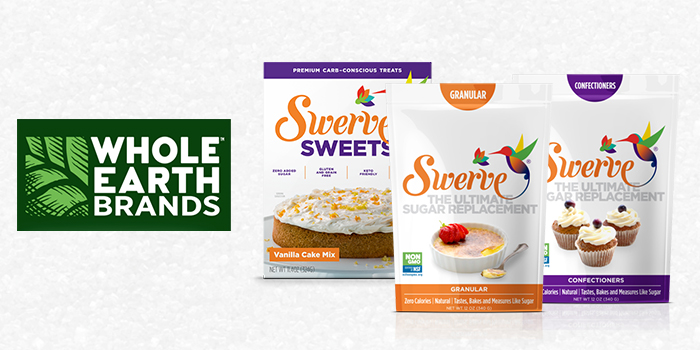
Whole Earth Brands Acquires Swerve for $80M
Whole Earth Brands announced this week the acquisition of zero sugar sweetener and baking mix brand Swerve for $80 million. With this acquisition, Whole Earth Brands has expanded its portfolio of zero/low sugar and low calorie sweeteners, which includes brands such as Equal and Pura Via.
Whipstitch Capital acted as the financial advisor to Swerve while Nomura acted as the financial advisor to Whole Earth Brands.
Swerve’s portfolio consists of a line of sugar alternatives marketed as “The Ultimate Sugar Replacement,” along with cake, cookie and pancake and waffle mixes.
In a press release, Whole Earth Brands CEO Albert Manzone said the acquisition, its first as a publicly traded company, “fits perfectly with our M&A strategy to invest in, and to accelerate the growth of, our branded consumer packaged goods (CPG) business in North America.” He also said the company anticipates Swerve to increase its North American net sales to $100 million, giving the company 10% market share in the sweetener category.
“It’s exciting to see continued progression in the ‘free-from’ categories,” Whole Earth Brands Executive Chairman Irwin Simons said. “It’s clear that consumer demand is strong and indicators point to even more upside as the health and wellness trend becomes a market force… We believe in the fundamentals of this sector, and we’ll continue to explore quality brands for potential future acquisition.”
Mondelēz State of Snacking Report Finds Changing Consumer Habits May Stick
This week Mondelēz released its second annual State of Snacking report in partnership with consumer polling specialist The Harris Poll that took a look at changing consumer trends in snacking, particularly as a result of COVID-19.
The report found an increase in snacking for adults and particularly millennials, who reported preferring snacks over meals. Over half of respondents claimed snacking is a “lifeline” for them amid the pandemic, while 77% said they’ve made a connection with other people through food over the last six months. Consumers are also snacking more mindfully, with two-thirds stating they are now more cognizant of portion control, and 56% particularly gravitating toward immunity-boosting snacks.
This year, comfort was the number one driver in snacking, the report found, with 53% of consumers turning to nostalgic favorites from childhood for comfort and 64% claiming snacking is a moment of peace in their day.
While the onset of the pandemic caused a quick shift in the ways consumers approach snacking, 64% of respondents believe these changes reflect a “new normal,” with 65% claiming the pandemic will ultimately have a long-term impact on their snacking habits. These changing habits are also reflected in how consumers purchase products, with 47% stating they now buy snacks online more often than in-stores, and 69% claiming they’ll continue to do so after the pandemic. Social media has emerged as a stronger channel for discovery for consumers, with 28% saying they have found snacks to try on these platforms.
“The results of our State of Snacking survey not only underscore the value snacking brings to families and individuals, but help us to even better understand the evolving needs of our consumers worldwide so that we can continue to adapt and offer them the snacks they want, where, when and how they want them,” said Dirk Van de Put, chairman and CEO of Mondelēz International.
